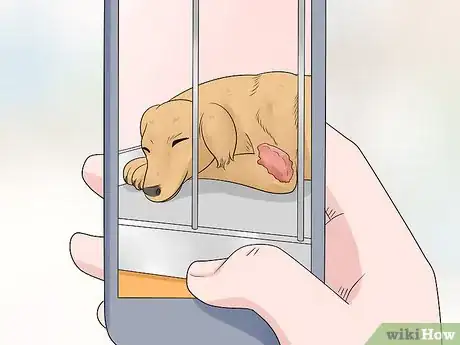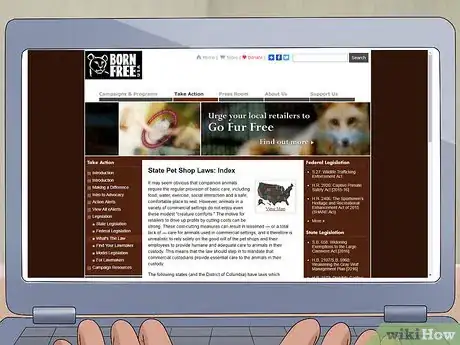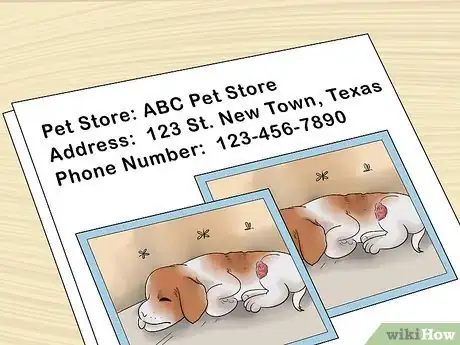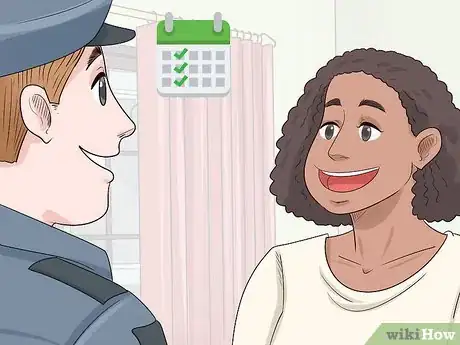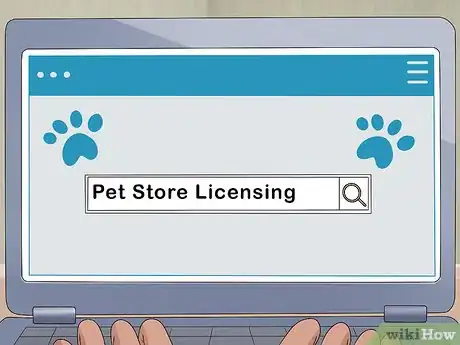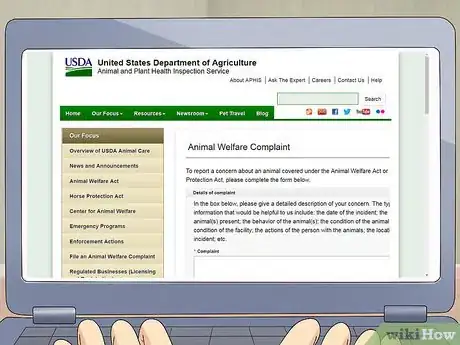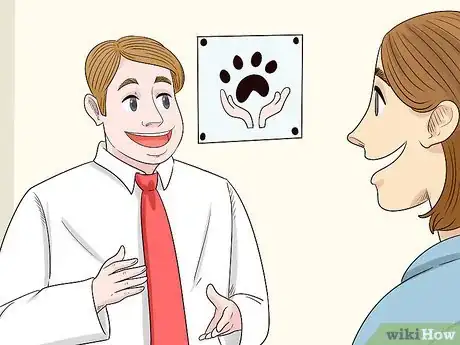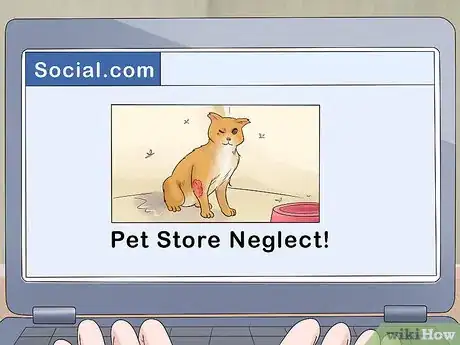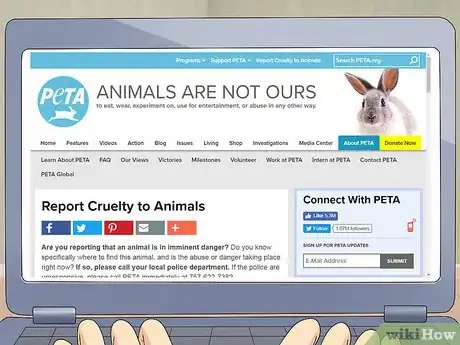This article was written by Jennifer Mueller, JD. Jennifer Mueller is an in-house legal expert at wikiHow. Jennifer reviews, fact-checks, and evaluates wikiHow's legal content to ensure thoroughness and accuracy. She received her JD from Indiana University Maurer School of Law in 2006.
This article has been viewed 21,333 times.
Seeing animals neglected in a pet store can be heart-breaking. If you want to do something to help those animals, your best option typically is to report the pet store to local law enforcement. Depending on where you live, there also may be state or local regulatory agencies that can take care of the problem. If law enforcement and regulatory agencies are slow to respond and you don't see the situation improving, do what you can to alert your community to the animals' plight.[1]
Steps
Reporting to Local Law Enforcement
-
1Document the situation as extensively as possible. Write down a chronological, factual account of everything you observed. Include as many details as possible, including the exact dates and times you observed the neglect or abuse.[2]
- Try to get photos or video if you can, but don't put yourself in harm's way or go into areas where you aren't supposed to be. Don't go into any areas of the store that are explicitly marked "Employees Only."
- Take note in particular of physical and environmental signs of neglect. For example, the animals may appear weak or unhealthy, or have untreated injuries. Their cages and the area surrounding them may be dirty, or they may have inadequate food or water.
-
2Check your state's animal welfare law. Reporting pet store neglect requires you to become somewhat of an expert on animal welfare law. In many areas, police may be unwilling to investigate the situation unless you can demonstrate to them that they have authority to do so.[3]
- The non-profit organization Born Free USA has an index of state laws governing pet shops on its website.
- You can also find an extensive collection of state and local laws and regulations in the National Agricultural Library on the USDA's website. Go to https://www.nal.usda.gov/awic/state-and-local to browse these documents.
- Highlight the laws or regulations you believe the pet store has violated, based on your observations. Take this copy with you when you file your report with law enforcement.
Advertisement -
3Find out which agency is responsible for enforcing animal laws. In most cases, your local police or animal control is responsible for investigating neglect at pet stores. In some areas, your local humane society may be responsible for the initial investigation.[4]
- The Animal Legal & Historical Center at Michigan State University also has a table with information on where to report animal cruelty and neglect in each state. Go to https://www.animallaw.info/topic/table-reporting-animal-cruelty-united-states to use the table and read background information on animal welfare laws.
- Some cities also have local ordinances regulating pet shops. For example, New York City has rules requiring pet shops to provide adequate care and sanitary conditions for all animals.[5]
-
4Gather your documentation and other records. Along with copies of your state's applicable law, compile any photos, videos, or notes you have documenting the neglect. You also want copies of any correspondence you've had with the pet store owners or employees.[6]
- Write down the exact street address and phone number for the pet store. Try to also get the names of the owners or managers of the store.
- Make copies of everything you have, including your own written statement. Don't turn over your only copy to law enforcement.
-
5File your report with law enforcement. Call a non-emergency number, or go to the station in person and tell an officer at the appropriate agency about the neglect you've witnessed. If you go to the station in person, bring any photos, videos, or other evidence along with you.[7]
- If you file your report over the phone, let the officer know if you have photo or video evidence. They may ask you to bring it in, or give you an email address you can send it to digitally.
- While it's possible to provide your report anonymously, it's usually better if you give them your name and your contact information. Anonymous reports can be more easily dismissed or ignored.
- Get a copy of the written report when it's completed. You may have to make a separate trip down to the station. The written report will have the name of the officer or detective assigned to investigate the report, as well as the case number.
-
6Follow up on your report. Law enforcement officers are busy, and you don't want to be a nuisance. However, check in at least once a week and find out how the investigation is progressing. If the officers know that you're serious about your report, they'll be more likely to investigate the situation more thoroughly.[8]
- Officers also may contact you for more information, or to take a statement about the neglect you observed. Don't embellish your account or make the situation seem more dire than it actually is. You can express your concern for the animals, but stick to the facts.
Filing Complaints with Regulatory Agencies
-
1Contact your state's department of agriculture. To the extent that your state regulates pet stores and others who sell companion animals to the public, the state department of agriculture typically is responsible for enforcing those regulations.[9]
- Search online for the website of your state's department of agriculture and look for companion animal or animal welfare regulations.
- The website will also have contact information you can use to file your complaint. Some state departments may also have a form for you to use to submit a complaint online.
-
2Find out if your state requires pet stores to be licensed. There are 27 states that require special licenses for pet stores that sell companion animals to the public. If you live in one of those states, you may be able to get the store's license suspended.[10]
- Licensing typically requires periodic inspections. Some states will also do inspections on demand in response to complaints that the pet store is violating the licensing requirements.
- Some licensing regulations only apply to cats and dogs, or only to dogs.
-
3Call your state or local health department. Unsanitary conditions at a pet store may fall under the jurisdiction of the health department. You can get a health inspector to conduct an inspection of the premises and potentially shut down the store for violations.[11]
- Look around the store for a health inspection sign. If the store is required to be inspected, the health inspection score must be displayed prominently.
- Search online for your state's health department website, or call the local information number (311 in many cities) to find out how to complain to the health department.
-
4Submit a complaint to the USDA. Even if your state's department of agriculture is unable or unwilling to do anything to stop the neglect, the federal department of agriculture may be able to help. Visit their website at https://www.aphis.usda.gov/aphis/ourfocus/animalwelfare/complaint-form to get started.[12]
- The USDA investigates violations of federal law, which come into play if the pet store sells wild or exotic animals. Exotic animals are animals not native to the United States, including chinchillas, parrots, and many lizards.
- The neglect you witness doesn't need to involve the exotic animals specifically for the USDA to take action. The pet store is covered by federal law in all operations if it sells exotic animals to the public.
- You can also call the USDA at (301) 851-3751. They will direct you to the appropriate regional department, and you can submit a written complaint there.[13]
Taking Your Case Public
-
1Get an expert opinion. If you know a veterinarian or other expert in animal care, ask them if they'll go to the pet store with you and observe the animals and the conditions in which they're kept. An expert's opinion that the animals are being neglected will help bolster your claims.[14]
- Have the expert write down their opinion. Provide a copy of the written opinion to any law enforcement or regulatory agencies you've already contacted.
-
2Write a letter to your local newspaper. Local newspapers accept letters to the editor on a variety of issues of concern to the community. Tell your story, and submit photos if you have them (or let the paper know you have photos available).[15]
- Let the newspaper know if you would be open to speaking to a reporter. Some newspapers may want to investigate the matter and publish their own story.
-
3Post information on social media. Use your social media accounts to rally friends and family to support your cause. You could even organize a small protest in front of the pet store to raise awareness about the issue.[16]
- If you plan to get people together to protest, make sure you're not in violation of any local ordinances. Call your local government and ask. You may need to get a permit.
-
4Send a tip to your local television news. Local TV news stations typically have an investigative report team that digs into issues of concern to people in the community. These teams rely on tips from the public, and can get greater exposure for the issue.[17]
- The investigative reporters will contact law enforcement and regulatory agencies and ask what they've done. If you've reported the issue to law enforcement or regulatory agencies and they've been slow to respond, a local news report may motivate them to respond.
-
5Contact animal rights organizations. Animal rights organizations, such as PETA (People for the Ethical Treatment of Animals) frequently investigate complaints of neglect and cruelty. Their investigations use tactics not available to the average individual, and they can often get authorities to respond more quickly.[18]
- These organizations have websites. You can usually report the problem through the website, or you can call the organization directly. You don't have to be a member of the organization or donate any money to them to file a report.
Warnings
- This article covers how to report pet store neglect in the United States. Other countries may have different procedures. If you live in another country, contact a nonprofit animal rights organization or animal welfare agency for more information.⧼thumbs_response⧽
References
- ↑ http://aldf.org/resources/when-you-witness-animal-cruelty/what-to-do-when-you-find-animals-in-substandard-conditions-at-a-pet-store/
- ↑ https://www.aspca.org/take-action/report-animal-cruelty
- ↑ http://aldf.org/resources/when-you-witness-animal-cruelty/what-to-do-when-you-find-animals-in-substandard-conditions-at-a-pet-store/
- ↑ https://www.animallaw.info/topic/table-reporting-animal-cruelty-united-states
- ↑ http://www1.nyc.gov/nyc-resources/service/5703/pet-shop-complaint
- ↑ http://aldf.org/resources/when-you-witness-animal-cruelty/what-to-do-when-you-find-animals-in-substandard-conditions-at-a-pet-store/
- ↑ https://www.aspca.org/take-action/report-animal-cruelty
- ↑ https://www.peta.org/issues/animal-companion-issues/animal-companion-factsheets/spot-animal-abuse/
- ↑ http://aldf.org/resources/when-you-witness-animal-cruelty/what-to-do-when-you-find-animals-in-substandard-conditions-at-a-pet-store/
- ↑ https://www.animallaw.info/topic/table-reporting-animal-cruelty-united-states
- ↑ https://www1.nyc.gov/nycbusiness/description/sale-of-small-animals-pet-shop
- ↑ http://aldf.org/resources/when-you-witness-animal-cruelty/what-to-do-when-you-find-animals-in-substandard-conditions-at-a-pet-store/
- ↑ https://www.aspca.org/take-action/report-animal-cruelty
- ↑ https://www.peta.org/issues/animal-companion-issues/animal-companion-factsheets/spot-animal-abuse/
- ↑ https://www.peta.org/issues/animal-companion-issues/animal-companion-factsheets/spot-animal-abuse/
- ↑ https://www.peta.org/issues/animal-companion-issues/animal-companion-factsheets/spot-animal-abuse/
- ↑ https://www.peta.org/issues/animal-companion-issues/animal-companion-factsheets/spot-animal-abuse/
- ↑ https://www.peta.org/issues/animal-companion-issues/animal-companion-factsheets/spot-animal-abuse/
